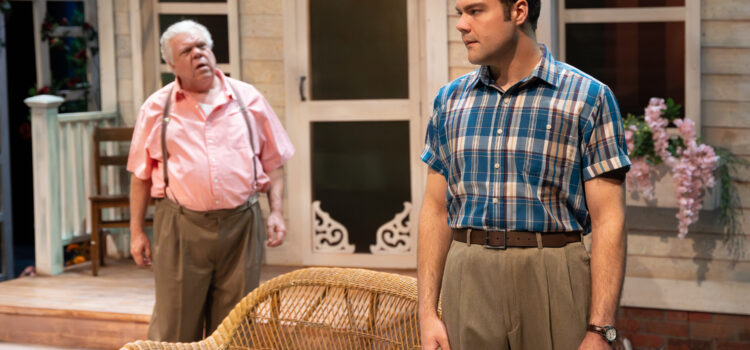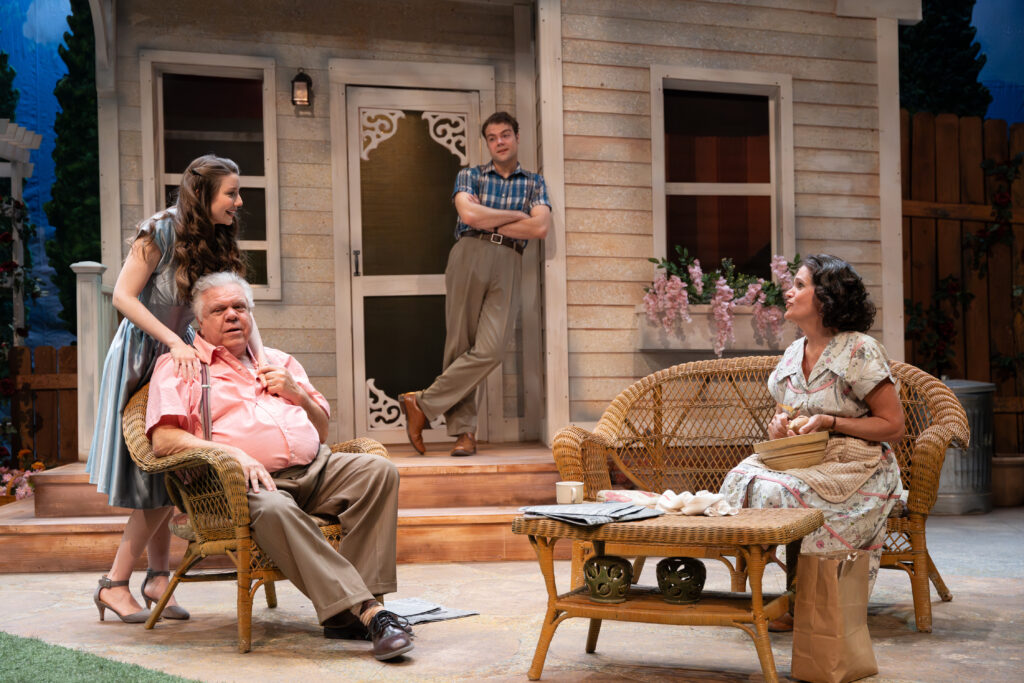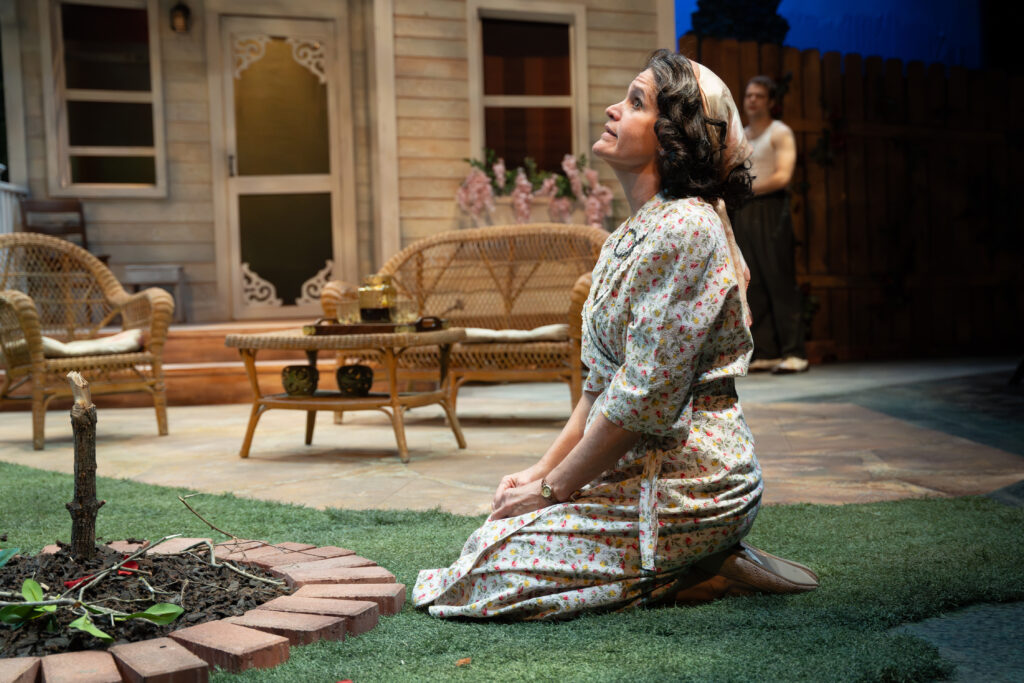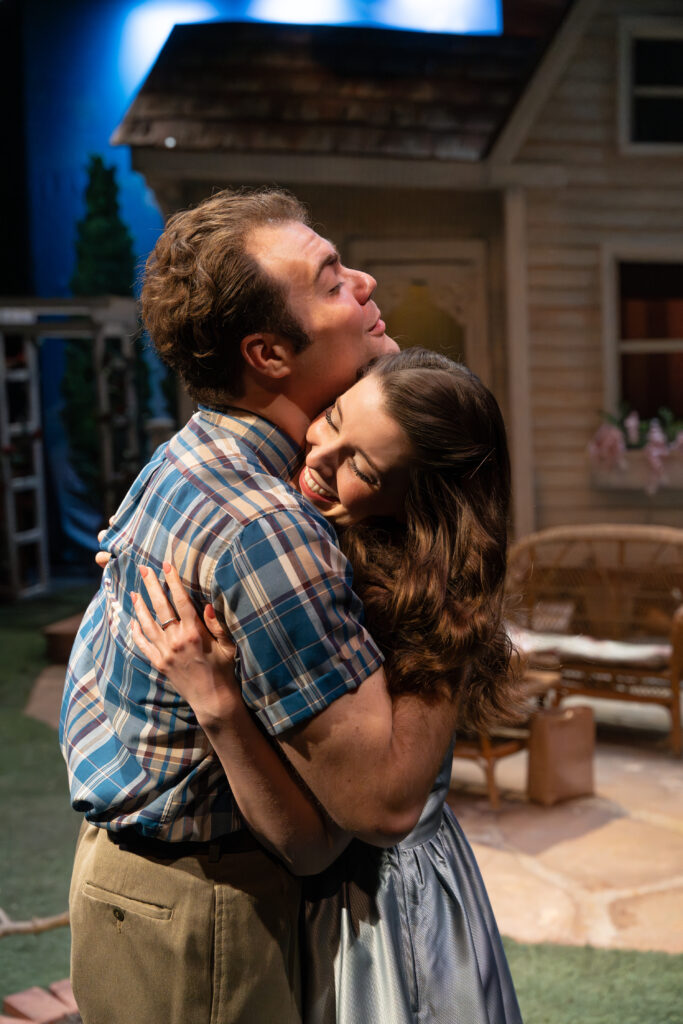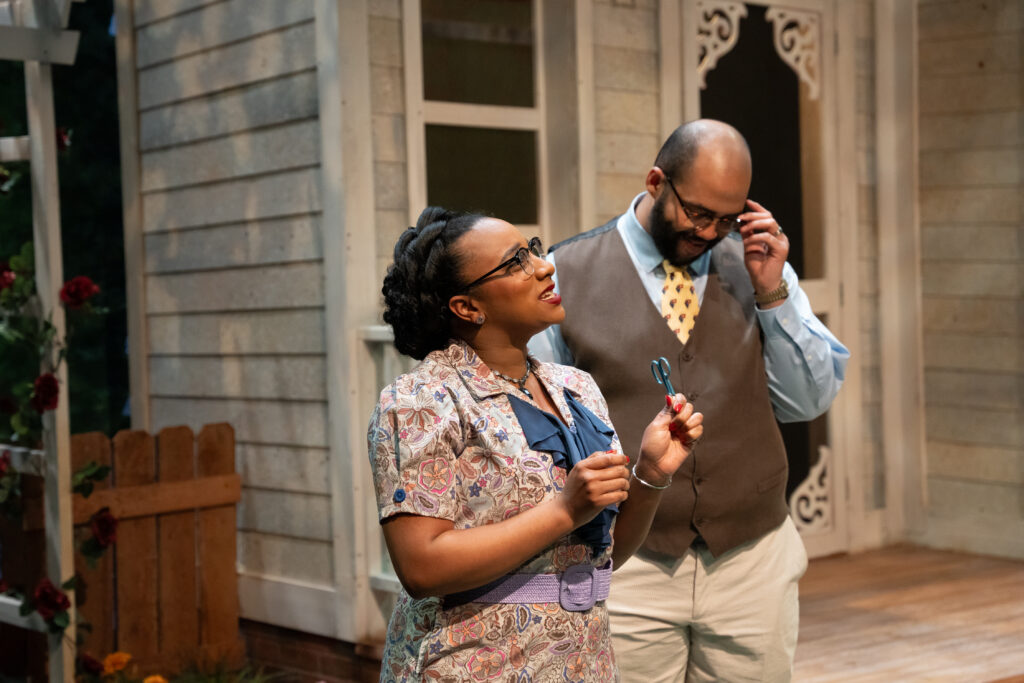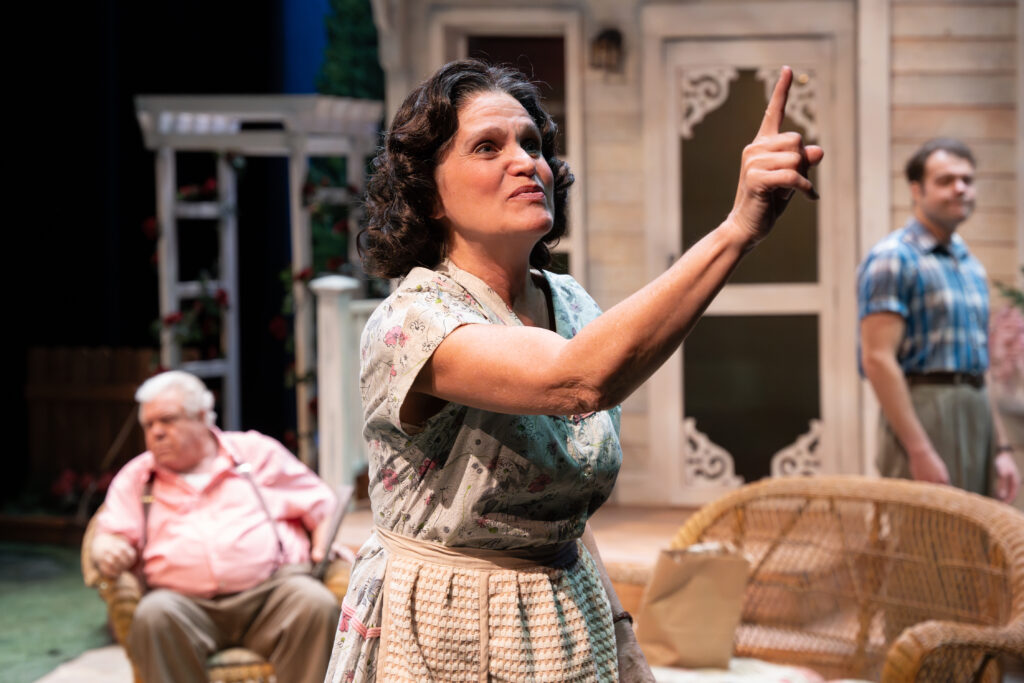By Lynn Venhaus
Whether you have a family that always puts the ‘fun’ in dysfunctional or is going through a temporary rough patch, you will find something relatable in Lila Rose Kaplan’s crowd-pleasing comedy-drama “We All Fall Down.”
Nowhere is an extended family’s quirkiness more apparent that at a holiday gathering, and this setting is a Passover seder with the Jewish but non-practicing Steins coming together.
The territory navigated is both familiar and foreign. When the playwright’s wit, director Rebekah Scallet’s finesse, and the cast’s crisp comic timing percolate on all cylinders, it’s splendid.
Yet, there is a busyness that comes across as somewhat annoying. The seven characters are all pre-occupied, with the parents and two grown adult children overstuffed with personality peculiarities, and the three guests underdeveloped. Perhaps some trimming would have made it feel less congested.
While the resolution is heartfelt, it doesn’t feel as genuine or as earned as it could be, for the relationships are complicated, and the revelations feel rushed.
As we all know, often when people try too hard to make a celebration joyful, it fails to meet expectations because of uncooperative moving parts.
Add befuddlement as to why this festival is happening now when it’s never been a big deal, which adds a layer – and everyone is in various degrees of a tizzy.
While psychologist and family therapist mom Linda (Mindy Shaw), history professor dad (Alan Knoll), yoga instructor daughter Ariel (Hailey Medrano), feminist activist-educator daughter Sammi (Bridgette Bassa), sarcastic aunt Nan (Jenni Ryan), a sweet but sensitive friend Bev (Bethany Barr) and an efficient assistant Ester (Taijha Silas) are preparing for this specific meal with their own ‘to-do’ lists, wackiness ensues, and universal truths give way.
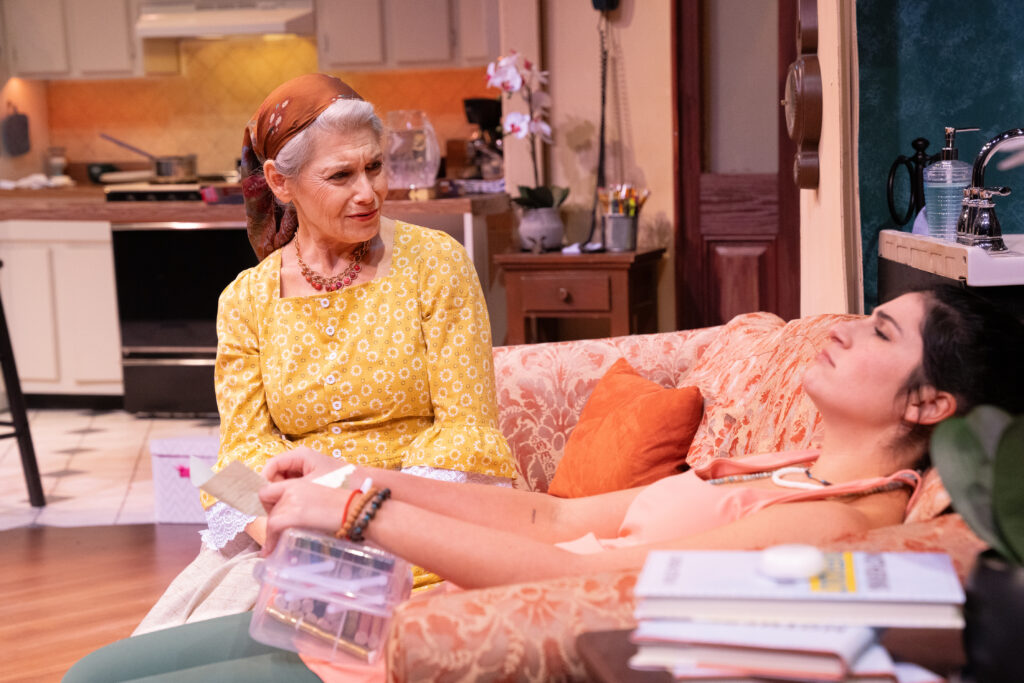
In Judaism, Passover commemorates the Hebrews’ liberation from slavery in Egypt, sparing the first-born of the Israelites on the eve of the Exodus. There are specific rituals handed down through generations, and Kaplan deftly explains traditions to those of us not in the know.
Those of other faiths can identify with their own heritage’s touchstones while the evergreen themes of people growing older, and children growing up strike chords.
The ensemble meshes well, conveying all the stress, resentments and aggravations that a holiday represents, but also their unique family dynamic and relationships. As in real life, a delicate balance between mothers, fathers, daughters and sisters is always shifting.
Sunrise, sunset
Swiftly fly the years
One season following another
Laden with happiness and tears
Knoll, whose performances are always lived in and first-rate, has shaded Saul with convincing layers, coming across at first as good-natured but concealing a troubled soul.
His memory is fading, and he’s confused, disconnected, and not understanding what’s happening, although he’s trying to cling tight to his routines.
His patterns are being interrupted by all the hubbub, and glimpses of what’s happening begin to be noticed by the others when they start paying attention. Most everyone is in their own little bubble and must eventually find the compassion they need at this moment. Frustrated, he won’t admit or can’t come to terms with his cognitive decline.
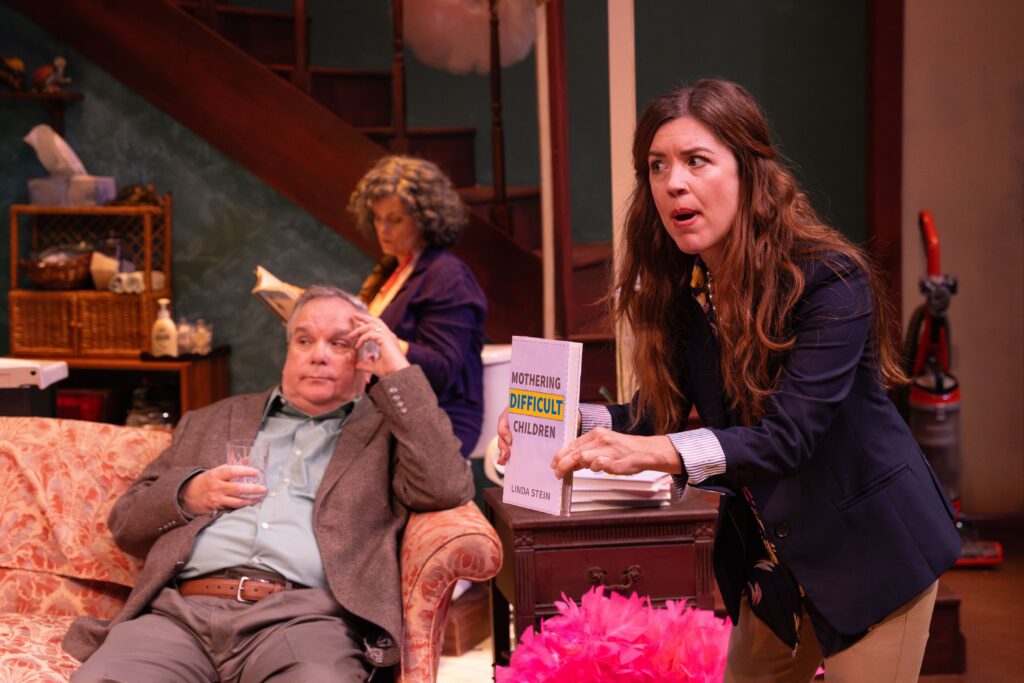
Those who’ve witnessed a loved one lose parts of themselves through Alzheimer’s disease or other forms of dementia can recognize the symptoms that Kaplan astutely presents.
A flustered, frantic melodramatic wife and mother, Linda is played as a demanding perfectionist with nervous energy by the lissome and facile Mindy Shaw.
This bossy control freak and bestselling author has a hidden agenda that keeps everyone guessing as to why she’s going to all this trouble. She’s a little kooky dressing up in costumes and flitting about.
Her two daughters, with secrets of their own, are focused on their problems and not why their dad may have retired early, why he’s drinking so much, or why mom’s making the signature dishes for what an old neighbor describes as “Jewish Easter.”
As adult daughters, Bassa and Medrano affect a realistic sibling rivalry and dissatisfaction with their current paths. Intelligent and limber performers, Bassa and Medrano bounce off each other like women with a history, and their rhythm is naturalistic.
There is an undercurrent of tension that may be connected to their mother’s book “Mothering Difficult Children”,” which is a hoot.” (What a great title!).
Ryan plays Saul’s outspoken sister, Aunt Nan, a part that seems straight out of sitcom land, as does Barr’s Bev, an empty nester who once lived across the street.
Silas has a nice turn as Linda’s graduate assistant who is tasked with singing “The Four Questions,” and does so beautifully.
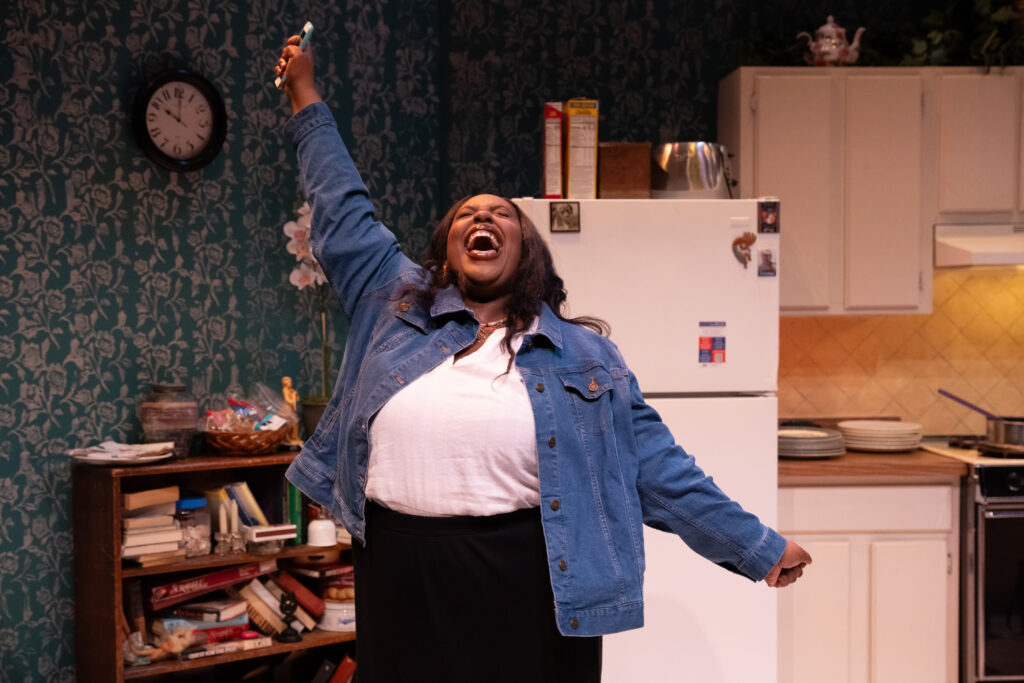
The two-story suburban home setting designed by Andrea Ball is a marvel of functionality and comfort. The kitchen is stocked with all the necessary ingredients and tools to make Kugel and matzo balls, and the girls’ childhood bedroom becomes an oasis (as does a bathroom).
The technical design work is as admirable as ever, with Michael Sullivan’s lighting design and Michelle Friedman Siler’s costume design both stellar components. Cecille “Cece” Entz’ prop work is noteworthy — an appealing mix of years of clutter.
Ellie Schwetye’s sound design is always significant, and this time her mix tape choices are interesting — especially the specific “War of 1812 Overture” that’s in the script.
Kaplan crafted this play with heart. Originally produced in 2020 in Boston, this presentation is the regional premiere in St. Louis. She has a flair for tackling issues from a woman’s point of view, which is refreshing. However, the tone shifts several times, which happens when the material is both a comedy and a drama.
Scallet, also the artistic director, has helmed this show in a light-hearted way, even though the theme is heavy – parents must be taken care of even when you can’t take care of yourself
She and the playwright met years ago when Scallet was directing Kaplan’s play “Catching Flight,” which was part of a new play development program, and became friends.
The main takeaway is that traditions should be appreciated and familial love is the foundation of life. Whatever our families are going through, we can lean on each other for comfort and strength. All families deal with loss, lose their way, and re-emerge with new customs, yet never forgetting those who have passed.
Memories are made, and passed on through generations — simple yet profound.
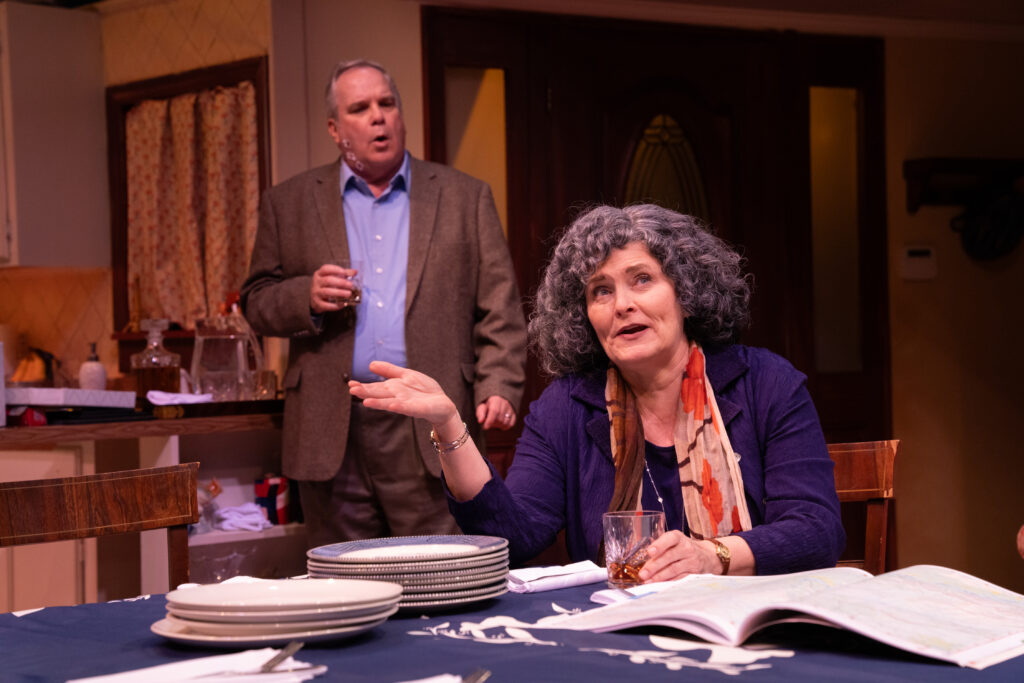
The New Jewish Theatre presents “We All Fall Down” from May 30 to June 16 at the JCCA’s Wool Studio Theatre, 2 Millstone Campus Drive, St. Louis. The play is 95 minutes without an intermission. Performances are Thursdays at 7:30 p.m., Saturdays at 4 and 8.p.m., and Sundays at 2 p.m. Individual tickets are $27- $58. Tickets are available by phone at 314.442.3283 or online at newjewishtheatre.org.
Special Note: Scallet will host two additional talkbacks with show audiences on Saturday, June 14 following the 4 p.m. performance, and on Thursday, June 6, following the 7:30 p.m. performance.
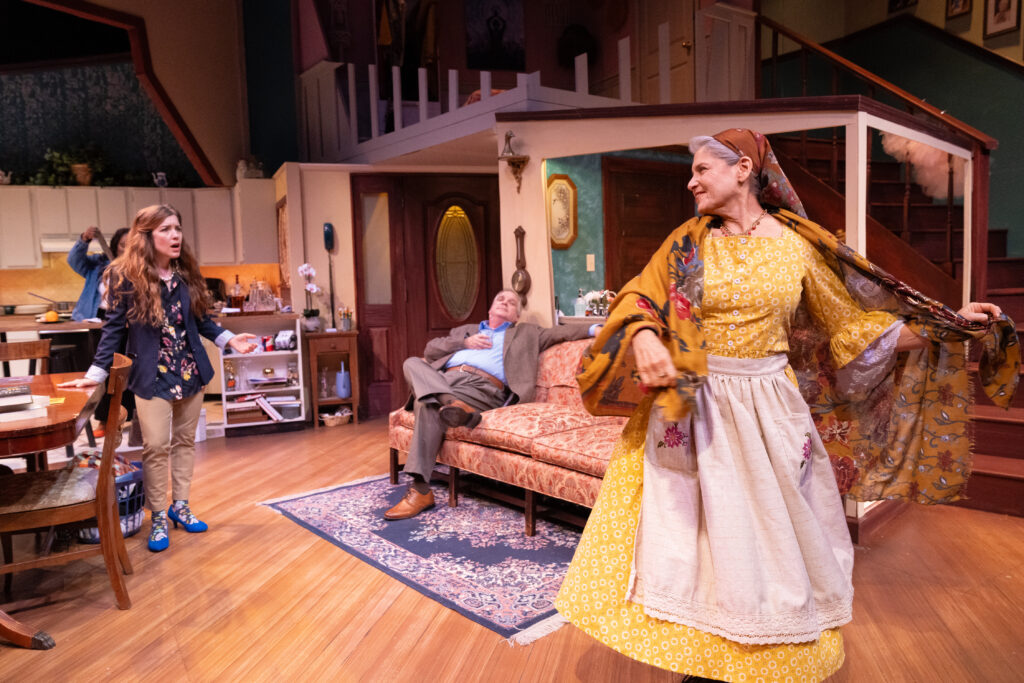

Lynn (Zipfel) Venhaus has had a continuous byline in St. Louis metro region publications since 1978. She writes features and news for Belleville News-Democrat and contributes to St. Louis magazine and other publications.
She is a Rotten Tomatoes-approved film critic, currently reviews films for Webster-Kirkwood Times and KTRS Radio, covers entertainment for PopLifeSTL.com and co-hosts podcast PopLifeSTL.com…Presents.
She is a member of Critics Choice Association, where she serves on the women’s and marketing committees; Alliance of Women Film Journalists; and on the board of the St. Louis Film Critics Association. She is a founding and board member of the St. Louis Theater Circle.
She is retired from teaching journalism/media as an adjunct college instructor.


